What is Egg Sharing?
If you wish to help other women by donating your eggs, you may wish to consider our Egg Sharing scheme. This is altruistic donation, and you will be offered counselling.
Sharing your eggs means donating half of the eggs collected in your IVF cycle to another woman who cannot conceive with her own eggs.
An Egg Sharing cycle costs £750* and before you start treatment will need to be aware of the financial, regulatory, legal and clinical details involved, before making an informed decision.
*If you need ICSI, there is a charge of £600 for this treatment (less than half the usual cost).
If you have any questions about egg sharing or how to start treatment please contact our experienced team who will be happy to help.
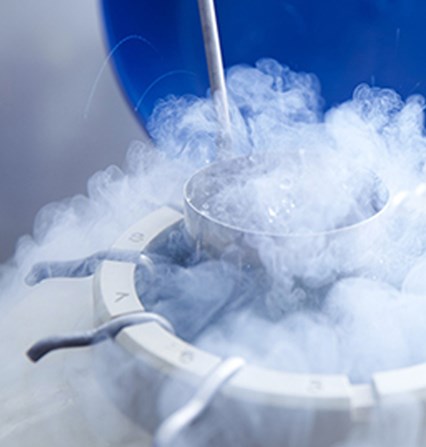
How does egg sharing work?
Egg sharing offers you the opportunity to help another woman with the life-changing gift of donor eggs they need to achieve their dream of becoming a mother.
There is a huge shortage of donor eggs in the UK. For women who have a low egg reserve, those who have experienced an early menopause, or been made infertile after life-saving cancer treatment, donor eggs offer the only hope of conception.
In an egg sharing cycle, you donate half the eggs you produce in one treatment cycle to someone who needs them, and keep the other half for your own IVF treatment.

*What's included in our Egg Sharing package?
Our abc egg sharing package includes:
- Review consultation
- Screening tests (Hepatitis B, Hepatitis C & HIV)
- Monitoring scans & blood tests (Oestradiol & Luteinizing Hormone)
- Ovarian stimulation and trigger medication
- Up to 3 weeks luteal support medication (progesterone pessaries)
- HFEA fee
- Counselling (elective)
- Expert clinical advice
- Egg collection & Sedation
- Blastocyst culture (if appropriate)
- Embryo transfer
- Early pregnancy scan
- Follow up consultation
Frequently asked questions
How much is my Initial Consultation and Scan if I wish to share my eggs?
You will need to pay the full price for your Initial Consultation and Scan, but if you complete an egg sharing cycle then you will receive a refund for the cost of your baseline scan, which is half of the cost of your Initial Consultation and Scan.
What is classed as a good ovarian reserve?
To ensure that we collect enough good quality eggs for both you and the receiver of your eggs, we require our egg sharers to have an AMH level of at least 20, and an Antral Follicle Count of at least 20. These will both be assessed as part of your Initial Consultation.
Does a certain number of eggs need to be collected at egg collection in order to share my eggs?
Yes, we need to collect a minimum of 8 eggs in order for you to be an egg sharer.
What happens if less than 8 eggs are collected at egg collection?
There are several options for you:
- You can continue with your IVF cycle, but you will need to pay the additional £2,000 cycle cost
- You can discontinue with your IVF cycle and your eggs will be discarded. But you won’t receive a refund for the £750 already paid
- You can choose to freeze your collected eggs at our standard freezing and storage fees and use them at a later date.
How do we define our key statements
What we mean by ‘Low Cost’
abc IVF are a provider of high quality, ‘low cost’ fertility treatment. We define ‘low cost’ as meaning that our prices are at least 25% lower than the average cost of a cycle of IVF in the UK. We have determined the average cost of one cycle of IVF in the UK as being £5,000 as reported by the Competition and Markets Authority and the Human Fertility Embryo Authority (HFEA), the UK’s fertility sector regulator in September 2022 <link>. It is our aim to continue to be a ‘low cost’ IVF provider and keep our costs below other providers in the UK.
What we mean by ‘High Quality’
abc IVF are a provider of ‘high quality’, low cost fertility treatment. We define our treatment as 'high quality' based on a number of key measures and processes:
1. That our licensed centres achieve inspection ratings of 4 or 5 out of 5 by the Human Fertility Embryo Authority (HFEA), the UK Fertility regulator.
2. That our clinics have fully trained GMC and NMC registered Nurses, Doctors and Consultants supporting them.
3. That our facilities are modern and fully compliant with the current clinical guidelines.
4. That we use modern technology and equipment from leading manufactures.
What we mean by ‘Excellent Success’
abc IVF deliver ‘excellent success’ for our patients. We know that clinic’s success and success rates play an important roles in patients decision on which clinic to choose for their treatment, so we aim to be clear and transparent about how we define 'excellent success'.
The Human Fertility Embryo Authority (HFEA), the fertility sector regulator, displays on their website the verified data for clinical pregnancies and live births for every licensed clinic in the UK for the last few years. They provide a number of points of analysis for each clinic to show the key success measures for broad and specific age groups. abc ivf is a satellite clinic of the HFEA licensed clinic - Create Fertility, whose results can be found on the HFEA website (LINK). abc patients have their egg collection and embryo transfer procedures at the CREATE Fertility licensed centre, by Create Fertility clinicians, and as such the success rates noted for abc IVF clinics are those of the licenced Create Fertility centre where treatment takes place.
We define “excellent” as exceeding national average success performance for live births per embryo transferred for all ages for the majority of clinics within the group, as shown on the latest verified year of data displayed on the HFEA website. Full details and further data can be found here.
Holland's IVF story
"Choosing to share my eggs was quite an easy decision for me and I’m still really glad I did it"
''We can’t believe after all this time she’s finally here, and we are loving being able to really enjoy the newborn stage where she’s still sleepy, and we can go to cafés and get out in the sun together - having a spring baby is really nice. It’s amazing to me that this real little living thing was once in a petri dish, and a freezer, and now she’s lying on my shoulder and chirping away in my ear.''
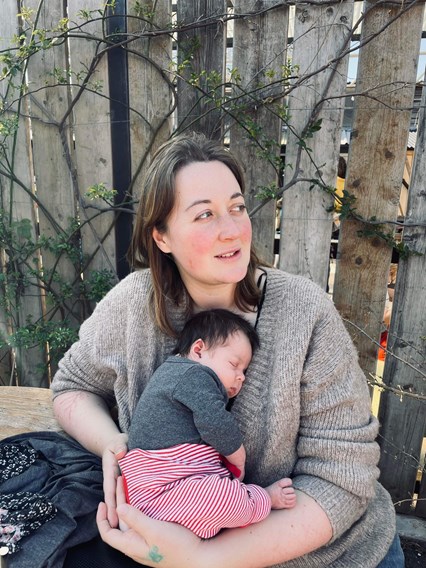
Egg sharing, step by step
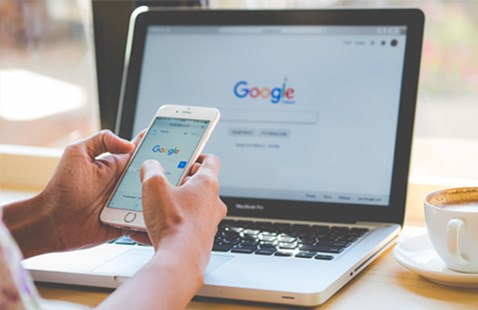
Call or email us to talk us about egg sharing and what that means. You can ask our team any questions you have, and we will talk through your medical history, and then set up the next appointment to suit you.

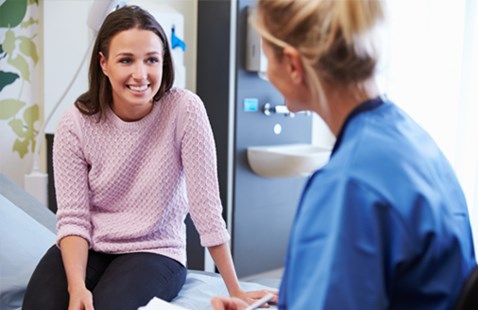
You’ll have your baseline scan with a fertility specialist who will assess your fertility health using a detailed fertility scan. They will take a blood sample to check your hormone levels and screen for any conditions that might prevent you from sharing your eggs. Your results will be discussed during your Initial Consultation, and if you meet the criteria, you can start your treatment when you’re ready

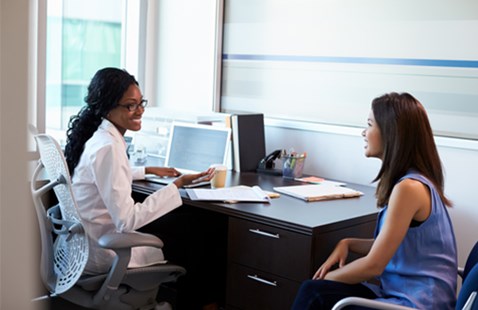
It’s important you are comfortable with every aspect of the sharing process, including the possibility that a recipient of your egg may get pregnant and your treatment might be unsuccessful, and that children born of your donation have the right to access identifying information about you once they turn the age of 18. Counselling is important, and our team will be with you every step of the way. You will also be provided with a copy of the egg sharing consent form and agreement with us, setting out all the terms of the arrangement: this will need to be signed by you before treatment commences. We will go through the agreement with you to ensure you fully understand the details and can make an informed decision.

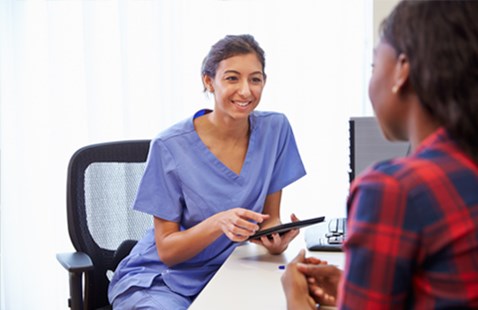
From here the treatment is very similar to a standard IVF cycle and our results show that egg sharing doesn’t affect your treatment success rates in any way. At the treatment consultation our Nurse Consultant will talk you through the medication you’ll need and show you how to use it.


During treatment, you will be closely monitored with scans and blood tests as appropriate, so we know the right time to collect your eggs. Each appointment takes around 20 minutes and you’ll have around two to three scans during your treatment cycle.

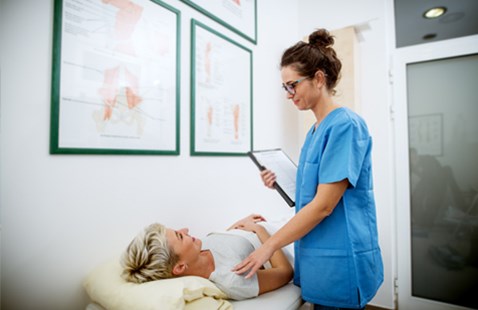
When our scans suggests that your egg sacks appear to be mature, you’ll take a trigger injection in preparation for the egg collection procedure. Our IVF Consultant will collect the eggs from your ovaries. The procedure takes around 45 minutes and takes place under sedation. After we collect your eggs, they’ll be divided equally, half for your treatment and half for donation. If we collect an odd number of eggs, the extra egg will go to you. We talk you through all of the details before you go ahead to be sure you are fully aware of the range of possible outcomes.

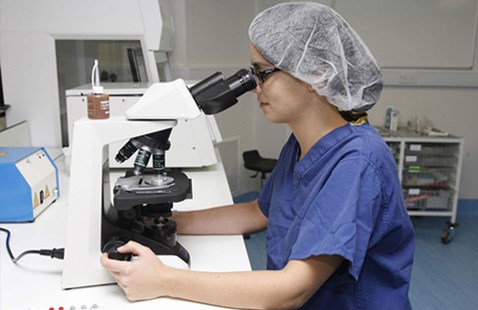
Your own IVF treatment continues in the normal way. The collected eggs and sperm are fertilised in the lab and fertilisation and embryo development will be carefully monitored by the embryology team.

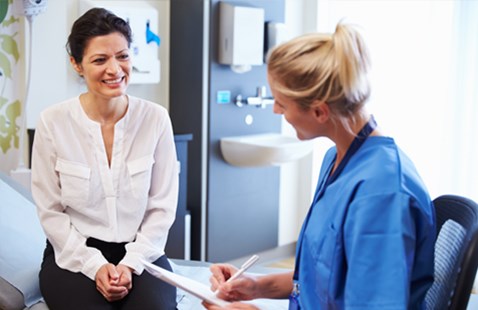
Three or five days after egg collection, depending on each individual case, the embryo/s will be ready to be transferred into your womb. The Embryo Transfer procedure usually takes around 30 minutes, and does not require sedation.

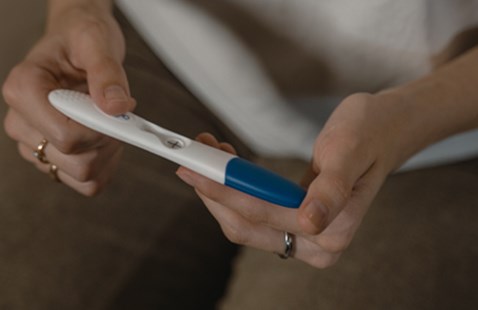
Two weeks after your embryo transfer, you will have a pregnancy test to check for pregnancy to determine whether your treatment has been successful.

What happens after I share my eggs?
After sharing, your eggs will be stored before they’re matched with a recipient.
The women who receive your eggs won’t have any information that could identify you personally, but we do provide basic information about you to help recipients looking for a match. You can also write a pen picture of yourself, and a goodwill message for the recipient of the eggs you donated. If you want to, you’re entitled to know about any babies born as a result of your donation. You won’t be given any personal details, but you can be told whether the baby is a boy or a girl, and the year they were born.






